英语文章翻译
英语美文摘抄翻译五篇
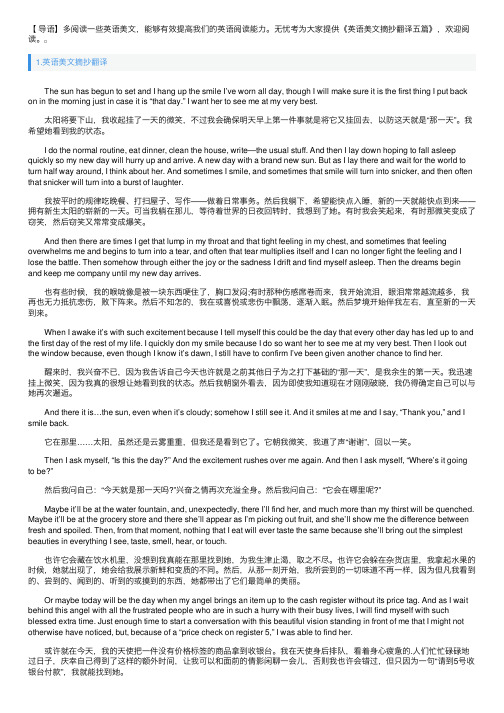
【导语】多阅读⼀些英语美⽂,能够有效提⾼我们的英语阅读能⼒。
⽆忧考为⼤家提供《英语美⽂摘抄翻译五篇》,欢迎阅读。
1.英语美⽂摘抄翻译 The sun has begun to set and I hang up the smile I’ve worn all day, though I will make sure it is the first thing I put back on in the morning just in case it is “that day.” I want her to see me at my very best. 太阳将要下⼭,我收起挂了⼀天的微笑,不过我会确保明天早上第⼀件事就是将它⼜挂回去,以防这天就是“那⼀天”。
我希望她看到我的状态。
I do the normal routine, eat dinner, clean the house, write—the usual stuff. And then I lay down hoping to fall asleep quickly so my new day will hurry up and arrive. A new day with a brand new sun. But as I lay there and wait for the world to turn half way around, I think about her. And sometimes I smile, and sometimes that smile will turn into snicker, and then often that snicker will turn into a burst of laughter. 我按平时的规律吃晚餐、打扫屋⼦、写作——做着⽇常事务。
然后我躺下,希望能快点⼊睡,新的⼀天就能快点到来——拥有新⽣太阳的崭新的⼀天。
英文文章带翻译
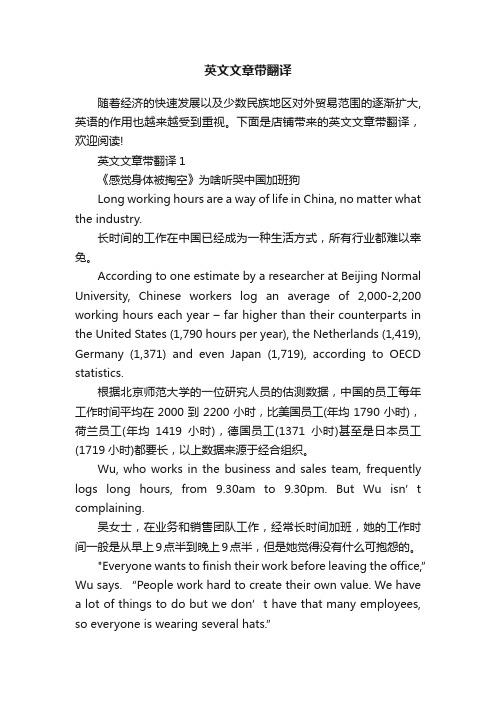
英文文章带翻译随着经济的快速发展以及少数民族地区对外贸易范围的逐渐扩大,英语的作用也越来越受到重视。
下面是店铺带来的英文文章带翻译,欢迎阅读!英文文章带翻译1《感觉身体被掏空》为啥听哭中国加班狗Long working hours are a way of life in China, no matter what the industry.长时间的工作在中国已经成为一种生活方式,所有行业都难以幸免。
According to one estimate by a researcher at Beijing Normal University, Chinese workers log an average of 2,000-2,200 working hours each year – far higher than their counterparts in the United States (1,790 hours per year), the Netherlands (1,419), Germany (1,371) and even Japan (1,719), according to OECD statistics.根据北京师范大学的一位研究人员的估测数据,中国的员工每年工作时间平均在2000到2200小时,比美国员工(年均1790小时),荷兰员工(年均1419小时),德国员工(1371小时)甚至是日本员工(1719小时)都要长,以上数据来源于经合组织。
Wu, who works in the business and sales team, frequently logs long hours, from 9.30am to 9.30pm. But Wu isn’t complaining.吴女士,在业务和销售团队工作,经常长时间加班,她的工作时间一般是从早上9点半到晚上9点半,但是她觉得没有什么可抱怨的。
优秀英语文章带中文翻译

优秀英语文章带中文翻译多学习一些优秀文章,对我们有很大的帮助。
以下是店铺为大家整理的优秀英语文章带中文翻译(精选7篇)相关内容,仅供参考,希望能够帮助大家。
优秀英语文章带中文翻译篇1付出与收获 Hard Work and IncomeI always hear about my friends’ complaining, they say their income is such low that they can’t not make ends meet. At first, I would pity for them, but in the long run, I find their work is so easy, they just sit in the office from 9 am to 5 pm, they even don’t need to go out for business. While I see another frien d, he works so hard, his working hour is very unstable, sometimes he even works until 9 pm. The fact is that he earns the most between my friends. It is true that no pain, no gain, if people want more, they need to pay out more. Comparing to be envy about other people’s great income, we’d better to work hard to realize what we want. There is not short-cut for people to get successful, working hard is the only way.我总是听到朋友们的抱怨,他们说收入太少了,以至于无法收支平衡。
英语小短文带中文翻译

英语小短文带中文翻译英语阅读技能既是重要的语言技能,也是重要的学习技能,是发展其他语言技能的基础和前提。
小编精心收集了英语小短文带中文翻译,供大家欣赏学习!英语小短文带中文翻译篇1Today, when I went home after school, I saw the delicious snack, so I wanted to buy one of the snacks, then I could not find my wallet, I searched it many times, at last, I had to admit that my wallet was lost. I felt so worried, so I turned back to find my wallet, I watched the road carefully, suddenly, a black dog was in front of me, I felt so scared. The hog yelled at me, so I ran, the dog run after me, I run into the shop and got rid of the dog. I have to went home because of it was dark, my mother came out and told me I forget to bring my wallet, how stupid I am.今天,当我放学回家时,我看到了美味的小吃,因此我想要买一些小吃,然后我找不到钱包,我搜索了很多遍,最后,我不得不承认我的钱包弄丢了。
我很着急,所以我返回去找我的钱包,我一路仔细查找,突然,一条黑狗在我前面,我很害怕。
那条狗朝着我叫,所以我跑了,狗追赶我,我跑进了一家商店,摆脱了那条狗。
由于天色已暗,我不得不回家,我的妈妈出来,告诉我我忘记了拿钱包,我是多么的愚蠢啊。
英语阅读范文带翻译三篇

【导语】写作⽂,也许是有些孩⼦们⽐较头疼的事,然⽽好的作⽂往往需要由⼼⽽发,思维不停,笔尖不断写下的流畅⽂章,为⼤家提供《英语阅读范⽂带翻译三篇》,欢迎阅读。
1.英语阅读范⽂带翻译 Some people insist that only today and tomorrow matter. But how much poorer we would be if we really lived by that rule! So much of what we do today is frivolous and futile and soon forgotten. So much of what we hope to do tomorrow never happens. The past is the bank in which we store our most valuable possession: the memories that give meaning and depth to our lives. Those who truly treasure the past will not bemoan the passing of the good old days, because days enshrined in memory are never lost. Death itself is powerless to still a remembered voice or erase a remembered smile. And for one boy who is now a man, there is a pond which neither time nor tide can change, where he can still spend a quiet hour in the sun. ⼀些⼈坚持认为只有今⽇与明⽇最重要。
(完整word版)英语短文带翻译20篇
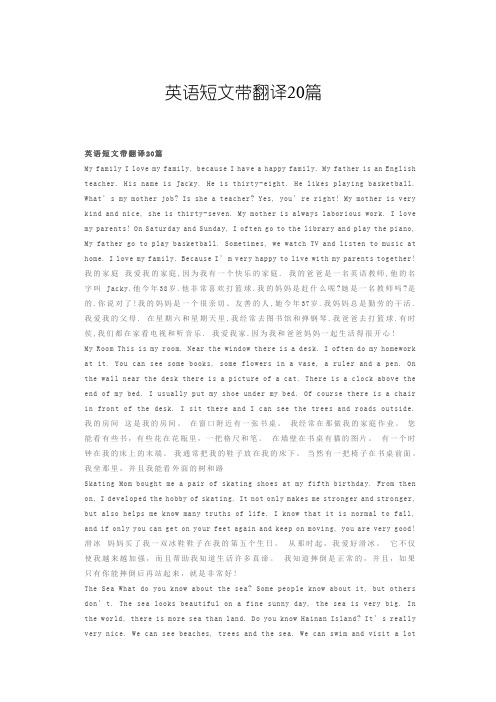
英语短文带翻译20篇英语短文带翻译20篇My family I love my family, because I have a happy family. My father is an English teacher. His name is Jacky. He is thirty-eight. He likes playing basketball. What’s my mother job? Is she a teacher? Yes, you’re right! My mother is very kind and nice, she is thirty-seven. My mother is always laborious work. I love my parents! On Saturday and Sunday, I often go to the library and play the piano, My father go to play basketball. Sometimes, we watch TV and listen to music at home. I love my family. Because I’m very happy to live with my parents together! 我的家庭我爱我的家庭,因为我有一个快乐的家庭. 我的爸爸是一名英语教师,他的名字叫Jacky.他今年38岁.他非常喜欢打篮球.我的妈妈是赶什么呢?她是一名教师吗?是的.你说对了!我的妈妈是一个很亲切、友善的人,她今年37岁.我妈妈总是勤劳的干活.我爱我的父母. 在星期六和星期天里,我经常去图书馆和弹钢琴.我爸爸去打篮球.有时侯,我们都在家看电视和听音乐. 我爱我家.因为我和爸爸妈妈一起生活得很开心!My Room This is my room. Near the window there is a desk. I often do my homework at it. You can see some books, some flowers in a vase, a ruler and a pen. On the wall near the desk there is a picture of a cat. There is a clock above the end of my bed. I usually put my shoe under my bed. Of course there is a chair in front of the desk. I sit there and I can see the trees and roads outside. 我的房间这是我的房间。
中英文互译文章
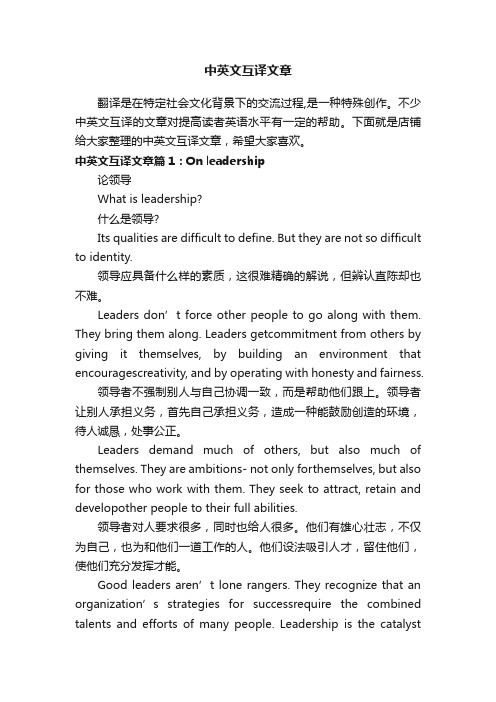
中英文互译文章翻译是在特定社会文化背景下的交流过程,是一种特殊创作。
不少中英文互译的文章对提高读者英语水平有一定的帮助。
下面就是店铺给大家整理的中英文互译文章,希望大家喜欢。
中英文互译文章篇1:On leadership论领导What is leadership?什么是领导?Its qualities are difficult to define. But they are not so difficult to identity.领导应具备什么样的素质,这很难精确的解说,但辨认直陈却也不难。
Leaders don’t force other people to go along with them. They bring them along. Leaders getcommitment from others by giving it themselves, by building an environment that encouragescreativity, and by operating with honesty and fairness.领导者不强制别人与自己协调一致,而是帮助他们跟上。
领导者让别人承担义务,首先自己承担义务,造成一种能鼓励创造的环境,待人诚恳,处事公正。
Leaders demand much of others, but also much of themselves. They are ambitions- not only forthemselves, but also for those who work with them. They seek to attract, retain and developother people to their full abilities.领导者对人要求很多,同时也给人很多。
他们有雄心壮志,不仅为自己,也为和他们一道工作的人。
英语每日阅读小短文带翻译

【导语】⼀般来说,英语短⽂就是指以英⽂来写作的短⽂。
它既可讲述道理,也可抒发感情,亦可记叙事情,但因其篇幅短⼩,故要求⽤语简洁,结构简单,观点简明。
⽆忧考为⼤家提供《英语每⽇阅读⼩短⽂带翻译》,欢迎阅读。
1.英语每⽇阅读⼩短⽂带翻译 The first snow came. How beautiful it was, falling so silently all day long, all night long, on the mountains, on the meadows, on the roofs of the living, on the graves of the dead! All white save the river, that marked its course by a winding black line across the landscape; and the leafless trees, that against the leaden sky now revealed more fully the wonderful beauty and intricacies of their branches. What silence, too, came with the snow, and what seclusion! Every sound was muffled, every noise changed to something soft and musical. No more tramping hoofs, no more rattling wheels! Only the chiming of the sleigh-bells, beating as swift and merrily as the hearts of children. 初雪降临,多么美啊!它整⽇整夜那么静静地飘着,落在⼭岭上,落在草地上,落在世⼈的屋顶上,落在逝者的坟墓上。
英文文章全文翻译阅读

英文文章全文翻译阅读英语和其它语言一样富有优美的意境、深刻的含义。
在进行英语文章赏析的过程中,多元素互动模式的构建,有利于我们能更加准确深刻的理解文章的意思。
下面是店铺带来的英文文章全文翻译阅读,欢迎阅读!英文文章全文翻译阅读篇一The Happy DoorHappiness is like a pebble1 dropped into a pool to set in motion an ever-widening circle of ripples2. As Stevenson has said, "Being happy is a duty."There is no exact definition of the word happiness. Happy people are happy for all sorts of reasons. The key is not wealth of physical well-being, since we find beggars, invalids and so-called failures who are extremely happy.Being happy is a sort of unexpected dividend. But staying happy is an accomplishment, a triumph of soul and character. It is not selfish to strive for it. It is, indeed, a duty to ourselves and others.Being unhappy is like an infectious disease. It causes people to shrink away from the sufferer. He soon finds himself alone, miserable and embittered. There is, however, a cure so simple as to seem, at first glance, ridiculous: if you don’t feel happy, pretend to be!It works. Before long you will find that instead of repelling3 people, you attract them. You discover how deeply rewarding it is to be the center of a wider and wider circles of good will.Then the make-believe becomes a reality. You possess the secret peace of mind, and can forget yourself in being of service to others.Being happy, once it is realized as a duty and established as a habit, opens doors into unimaginable gardens thronged with grateful friends.快乐好似掷入池塘里的一枚鹅卵石,会激起不断扩散的一圈圈涟漪。
英语文章翻译范本五份
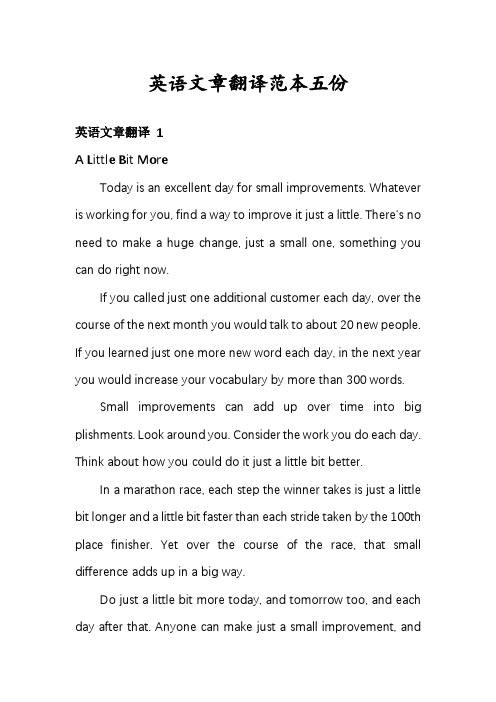
英语文章翻译范本五份英语文章翻译 1A Little Bit MoreToday is an excellent day for small improvements. Whatever is working for you, find a way to improve it just a little. There’s no need to make a huge change, just a small one, something you can do right now.If you called just one additional customer each day, over the course of the next month you would talk to about 20 new people. If you learned just one more new word each day, in the next year you would increase your vocabulary by more than 300 words.Small improvements can add up over time into big plishments. Look around you. Consider the work you do each day. Think about how you could do it just a little bit better.In a marathon race, each step the winner takes is just a little bit longer and a little bit faster than each stride taken by the 100th place finisher. Yet over the course of the race, that small difference adds up in a big way.Do just a little bit more today, and tomorrow too, and each day after that. Anyone can make just a small improvement, andthat can make a big, big difference.翻译:再多一点点今天就是你可以做改进的极好的一天。
英文文章翻译成中文3篇
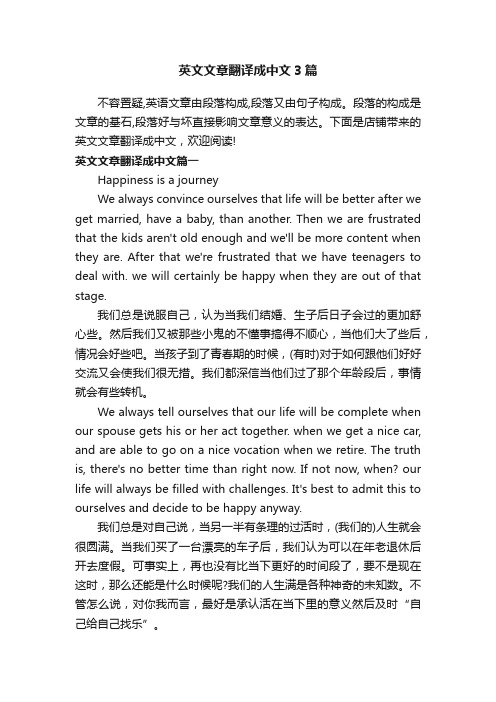
英文文章翻译成中文3篇不容置疑,英语文章由段落构成,段落又由句子构成。
段落的构成是文章的基石,段落好与坏直接影响文章意义的表达。
下面是店铺带来的英文文章翻译成中文,欢迎阅读!英文文章翻译成中文篇一Happiness is a journeyWe always convince ourselves that life will be better after we get married, have a baby, than another. Then we are frustrated that the kids aren't old enough and we'll be more content when they are. After that we're frustrated that we have teenagers to deal with. we will certainly be happy when they are out of that stage.我们总是说服自己,认为当我们结婚、生子后日子会过的更加舒心些。
然后我们又被那些小鬼的不懂事搞得不顺心,当他们大了些后,情况会好些吧。
当孩子到了青春期的时候,(有时)对于如何跟他们好好交流又会使我们很无措。
我们都深信当他们过了那个年龄段后,事情就会有些转机。
We always tell ourselves that our life will be complete when our spouse gets his or her act together. when we get a nice car, and are able to go on a nice vocation when we retire. The truth is, there's no better time than right now. If not now, when? our life will always be filled with challenges. It's best to admit this to ourselves and decide to be happy anyway.我们总是对自己说,当另一半有条理的过活时,(我们的)人生就会很圆满。
英语文章阅读带翻译3篇

英语文章阅读带翻译3篇在世界经济全球化及中国加入WTO的形势下,社会需要大量能够用英语在国际上进行科技、经贸、法律和文化等方面交流的专业人才。
下面是店铺带来的英语文章阅读带翻译,欢迎阅读!英语文章阅读带翻译篇一In the public interestThe Scandinavian countries are much admired all over the world for their enlightened social policies. Sweden has evolved an excellent system for protecting the individual citizen from high-handed or incompetent public officers. The system has worked so well, that it has been adopted in other countries like Denmark, Norway, Finland, and New Zealand. Even countries with large populations like Britain and the United States are seriously considering imitating the Swedes.The Swedes were the first to recognize that public officials like civil servants, collectors can make mistakes or act over-zealously in the belief that they are serving the public. As long ago as 1809, the Swedish Parliament introduced a scheme to safeguard the interest of the individual. A parliamentary committee representing all political parties appoints a person who is suitably qualified to investigate private grievances against the State. The official title of the person is 'Justiteombudsman', but the Swedes commonly refer to him as the 'J.O.' or 'Ombudsman'. The Ombudsman is not subject to political pressure. He investigates complaints large and small that come to him from all levels of society. As complaints must be made in writing, the Ombudsman receives an average of 1200 letters a year. He has eight lawyer assistants to help him and he examines every single letter in detail. There is nothing secretive about theOmbudsman's work, for his correspondence is open to public inspection. If a citizen's complaint is justified, the Ombudsman will act on his behalf. The action he takes varies according to the nature of the complaint. He may gently reprimand an official or even suggest to parliament that a law be altered. The following case is a typical example of the Ombudsman's work.A foreigner living in a Swedish village wrote to the Ombudsman complaining that he had been ill-treated by the police, simply because he was a foreigner. The Ombudsman immediately wrote to the Chief of Police in the district asking him to send a record of the case. There was nothing in the record to show that the foreigner's complaint was justified and the Chief of Police stoutly denied the accusation. It was impossible for the Ombudsman to take action, but when he received a similar complaint from another foreigner in the same village, he immediately sent one of his lawyers to investigate the matter. The lawyer ascertained that a policeman had indeed dealt roughly with foreigners on several occasions. The fact that the policeman was prejudiced against foreigners could not be recorded in he official files. It was only possible for the Ombudsman to find this out by sending one of his representatives to check the facts. The policeman in question was severely reprimanded and was informed that if any further complaints were lodged against him, he would be prosecuted. The Ombudsman's prompt action at once put an end to an unpleasant practice which might have gone unnoticed.斯堪的纳维亚半岛各国实行开明的社会政策,受到全世界的推崇。
英文文章带翻译

英文文章带翻译英语文章的难度是存在等级的,而难度的划分有很多原则。
下面是店铺带来的英文文章带翻译,欢迎阅读!英文文章带翻译篇一热爱生活 (Love Your Life )Henry David Thoreau 享利•大卫•梭罗However mean your life is,meet it and live it ;do not shun it and call it hard names.It is not so bad as you are.It looks poorest when you are richest.The fault-finder will find faults in paradise.Love your life,poor as it is.You may perhaps have some pleasant,thrilling,glorious hourss,even in a poor-house.The setting sun is reflected from the windows of the alms-house as brightly as from the rich man's abode;the snow melts before its door as early in the spring.I do not see but a quiet mind may live as contentedly there,and have as cheering thoughts,as in a palace.The town's poor seem to me often to live the most independent lives of any.May be they are simply great enough to receive without misgiving.Most think that they are above being supported by the town;but it often happens that they are not above supporting themselves by dishonest means.which should be more disreputable.Cultivate poverty like a garden herb,like sage.Do not trouble yourself much to get new things,whether clothes or friends,Turn the old,return to them.Things do not change;we change.Sell your clothes and keep your thoughts.不论你的生活如何卑贱,你要面对它生活,不要躲避它,更别用恶言咒骂它。
经典英语文章加翻译 经典英语短文加翻译5篇
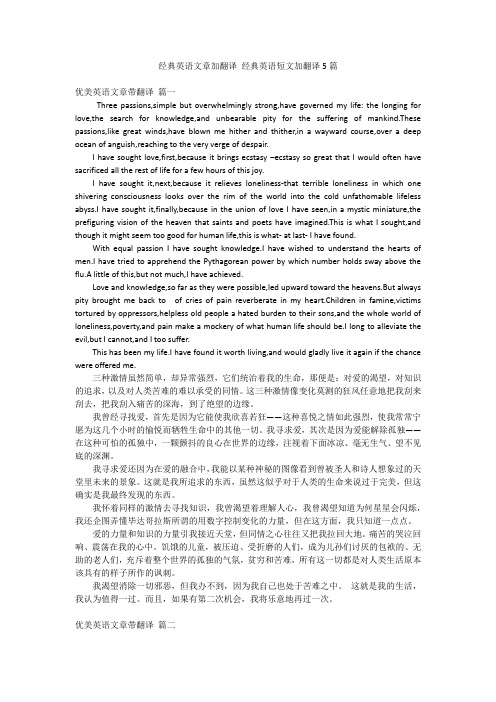
经典英语文章加翻译经典英语短文加翻译5篇优美英语文章带翻译篇一Three passions,simple but overwhelmingly strong,have governed my life: the longing for love,the search for knowledge,and unbearable pity for the suffering of mankind.These passions,like great winds,have blown me hither and thither,in a wayward course,over a deep ocean of anguish,reaching to the very verge of despair.I have sought love,first,because it brings ecstasy –ecstasy so great that I would often have sacrificed all the rest of life for a few hours of this joy.I have sought it,next,because it relieves loneliness-that terrible loneliness in which one shivering consciousness looks over the rim of the world into the cold unfathomable lifeless abyss.I have sought it,finally,because in the union of love I have seen,in a mystic miniature,the prefiguring vision of the heaven that saints and poets have imagined.This is what I sought,and though it might seem too good for human life,this is what- at last- I have found.With equal passion I have sought knowledge.I have wished to understand the hearts of men.I have tried to apprehend the Pythagorean power by which number holds sway above the flu.A little of this,but not much,I have achieved.Love and knowledge,so far as they were possible,led upward toward the heavens.But always pity brought me back to of cries of pain reverberate in my heart.Children in famine,victims tortured by oppressors,helpless old people a hated burden to their sons,and the whole world of loneliness,poverty,and pain make a mockery of what human life should be.I long to alleviate the evil,but I cannot,and I too suffer.This has been my life.I have found it worth living,and would gladly live it again if the chance were offered me.三种激情虽然简单,却异常强烈,它们统治着我的生命,那便是:对爱的渴望,对知识的追求,以及对人类苦难的难以承受的同情。
英语文章翻译
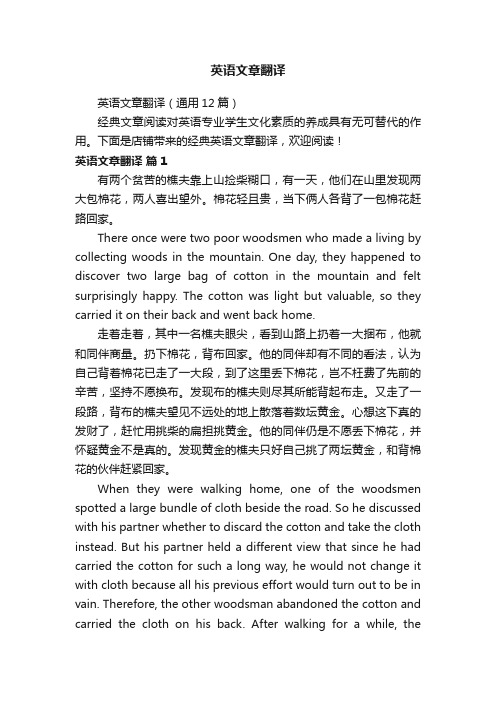
英语文章翻译英语文章翻译(通用12篇)经典文章阅读对英语专业学生文化素质的养成具有无可替代的作用。
下面是店铺带来的经典英语文章翻译,欢迎阅读!英语文章翻译篇1有两个贫苦的樵夫靠上山捡柴糊口,有一天,他们在山里发现两大包棉花,两人喜出望外。
棉花轻且贵,当下俩人各背了一包棉花赶路回家。
There once were two poor woodsmen who made a living by collecting woods in the mountain. One day, they happened to discover two large bag of cotton in the mountain and felt surprisingly happy. The cotton was light but valuable, so they carried it on their back and went back home.走着走着,其中一名樵夫眼尖,看到山路上扔着一大捆布,他就和同伴商量。
扔下棉花,背布回家。
他的同伴却有不同的看法,认为自己背着棉花已走了一大段,到了这里丢下棉花,岂不枉费了先前的辛苦,坚持不愿换布。
发现布的樵夫则尽其所能背起布走。
又走了一段路,背布的樵夫望见不远处的地上散落着数坛黄金。
心想这下真的发财了,赶忙用挑柴的扁担挑黄金。
他的同伴仍是不愿丢下棉花,并怀疑黄金不是真的。
发现黄金的樵夫只好自己挑了两坛黄金,和背棉花的伙伴赶紧回家。
When they were walking home, one of the woodsmen spotted a large bundle of cloth beside the road. So he discussed with his partner whether to discard the cotton and take the cloth instead. But his partner held a different view that since he had carried the cotton for such a long way, he would not change it with cloth because all his previous effort would turn out to be in vain. Therefore, the other woodsman abandoned the cotton and carried the cloth on his back. After walking for a while, thewoodsman who carried the cloth spotted several jars of gold disseminated on the ground not far away. He felt so thrilled that he was going to be a wealthy man. So he gave up the cloth and used his carrying pole to carry two jars of gold, while his partner was still reluctant to abandon the cotton and wondering whether the gold was real or not.谁知道刚走到山下。
5篇英语精读文章翻译
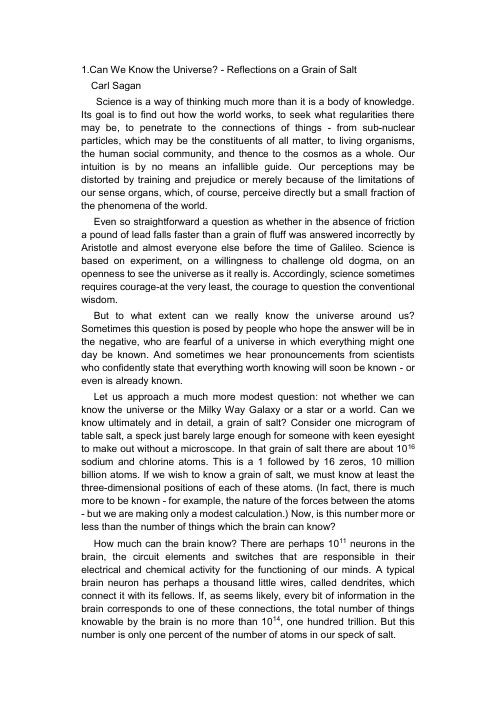
1.Can We Know the Universe? - Reflections on a Grain of SaltCarl SaganScience is a way of thinking much more than it is a body of knowledge. Its goal is to find out how the world works, to seek what regularities there may be, to penetrate to the connections of things - from sub-nuclear particles, which may be the constituents of all matter, to living organisms, the human social community, and thence to the cosmos as a whole. Our intuition is by no means an infallible guide. Our perceptions may be distorted by training and prejudice or merely because of the limitations of our sense organs, which, of course, perceive directly but a small fraction of the phenomena of the world.Even so straightforward a question as whether in the absence of friction a pound of lead falls faster than a grain of fluff was answered incorrectly by Aristotle and almost everyone else before the time of Galileo. Science is based on experiment, on a willingness to challenge old dogma, on an openness to see the universe as it really is. Accordingly, science sometimes requires courage-at the very least, the courage to question the conventional wisdom.But to what extent can we really know the universe around us? Sometimes this question is posed by people who hope the answer will be in the negative, who are fearful of a universe in which everything might one day be known. And sometimes we hear pronouncements from scientists who confidently state that everything worth knowing will soon be known - or even is already known.Let us approach a much more modest question: not whether we can know the universe or the Milky Way Galaxy or a star or a world. Can we know ultimately and in detail, a grain of salt? Consider one microgram of table salt, a speck just barely large enough for someone with keen eyesight to make out without a microscope. In that grain of salt there are about 1016 sodium and chlorine atoms. This is a 1 followed by 16 zeros, 10 million billion atoms. If we wish to know a grain of salt, we must know at least the three-dimensional positions of each of these atoms. (In fact, there is much more to be known - for example, the nature of the forces between the atoms - but we are making only a modest calculation.) Now, is this number more or less than the number of things which the brain can know?How much can the brain know? There are perhaps 1011 neurons in the brain, the circuit elements and switches that are responsible in their electrical and chemical activity for the functioning of our minds. A typical brain neuron has perhaps a thousand little wires, called dendrites, which connect it with its fellows. If, as seems likely, every bit of information in the brain corresponds to one of these connections, the total number of things knowable by the brain is no more than 1014, one hundred trillion. But this number is only one percent of the number of atoms in our speck of salt.So in this sense the universe is intractable, astonishingly immune to any human attempt at full knowledge. We cannot on this level understand a grain of salt, much less the universe.But let us look more deeply at our microgram of salt. Salt happens to be a crystal in which, except for defects in the structure of the crystal lattice, the position of every sodium and chlorine atom is predetermined. If we could shrink ourselves into this crystalline world, we could see rank upon rank of atoms in an ordered array, a regularly alternating structure - sodium, chlorine, sodium, chlorine, specifying the sheet of atoms we are standing on and all the sheets above us and below us. An absolutely pure crystal of salt could have the position of every atom specified by something like 10 bits of information. This would not strain the information-carrying capacity of the brain.If the universe had natural laws that governed its behavior to the same degree of regularity that determines a crystal of salt, then, of course, the universe would be knowable.Even if there were many such laws, each of considerable complexity, human beings might have the capacity to understand them all.Even if such knowledge exceeded the information-carrying capacity of the brain, we might store the additional information outside our bodies - in books, for example, or in computer memories - and still, in some sense, know the universe.Human beings are, understandably, highly motivated to find regularities, natural laws. The search for rules, the only possible way to understand such a vast and complex universe, is called science. The universe forces those who live in it to understand it. Those creatures who find everyday experience a muddled jumble of events with no predictability, no regularity, are in grave peril. The universe belongs to those who, at least to some degree, have figured it out.It is an astonishing fact that there are laws of nature, rules that summarize conveniently - not just qualitatively but quantitatively - how the world works. We might imagine a universe in which there are no such laws, in which the 1080 elementary particles that make up a universe like our own behave with utter and uncompromising abandon. To understand such a universe we would need a brain at least as massive as the universe. It seems unlikely that such a universe could have life and intelligence, because beings and brains require some degree of internal stability and order. But even if in a much more random universe there were such beings with an intelligence much greater than our own, there could not be much knowledge, passion or joy.Fortunately for us, we live in a universe that has at least important parts that are knowable. Our common-sense experience and our evolutionary history have prepared us to understand something of the workaday world.When we go into other realms, however, common sense and ordinary intuition turn out to be highly unreliable guides.For myself, I like a universe that includes much that is unknown and, at the same time, much that is knowable. A universe in which everything is known would be static and dull, as boring as the heaven of some weak-minded theologians. A universe that is unknowable is no fit place for a thinking being. The ideal universe for us is one very much like the universe we inhabit. And I would guess that this is not really much of a coincidence.2.Extraterrestrial LifeA. Bowdoin Van RiperWhether life exists anywhere in the universe besides Earth is an open question, one that Western scholars have debated for over 200 years without coming significantly closer to a solution.Proving that extraterrestrial life does not exist is, by definition, impossible.Our galaxy is too large for us to investigate every corner of it where life might have arisen since we last looked, and it is only one galaxy among many.Proving that extraterrestrial life does exist is easy in principle but difficult in practice.The discovery of an alien organism would provide proof, but searching for one would require interstellar travel-something well beyond humans' technological reach.NONINTELLIGENT LIFE IN OUR GALAXYMost of the planets and moons in our solar system appear inhospitable to life as we know it. Jupiter, Saturn, Uranus, and Neptune lack solid surfaces and receive only limited sunlight. Mercury is baked and irradiated by the sun, while Pluto is perpetually dark and frozen. Venus's dense atmosphere creates crushing pressures, intense heat, and corrosive rain at its surface. Few of the solar system's moons, and none of its asteroids, are large enough to hold even a thin atmosphere. The most likely places to search for life in our solar system appear to be Mars and the larger moons of Jupiter and Saturn. Robot spacecraft have photographed Mars, Europa, and Titan from space. Robot landers have explored small portions of the Martian surface. Finding intelligent life on any of the three worlds now seems unlikely. Finding simpler forms of life, if they exist at all, is likely to require systematic observation at close range.The probability that life exists somewhere else in our galaxy is high, simply because the number of stars in our galaxy is so high. Even if only a tiny fraction of stars have planets, even if only a tiny fraction of those planets are suitable for life, even if life only develops on a fraction of those planets, and even if intelligence only evolves on a fraction of the planets with life, there are still likely to be thousands of life-bearing planets in our galaxy. Finding such life will, however, mean finding the planets. Even ifinterstellar travel was routine, the job would be daunting. It would mean finding one world among thousands, with no evidence of its special status visible at interstellar distances.INTELLIGENT LIFE IN OUR GALAXYIntelligent life, if it exists elsewhere, is likely to be much rarer than nonintelligent life. It may, however, prove easier actually to find. Our own species beams a steady stream of radio and television signals into space and attaches information-laden metal plates to spacecraft headed out of the solar system. The signals are an accidental by-product of broadcasting; the plates are a conscious attempt at communication. Both announce our existence, our level of technological sophistication, and a tiny bit about our culture.It is also possible that a sufficiently intelligent and technologically adept species might find us before we develop the ability to go looking for it. Believers in the extraterrestrial origin of UFOs argue that such encounters have already happened, either in the past or in the present. Most mainstream scientists are skeptical of such beliefs, explaining purported encounters with aliens in more prosaic terms.EXTRATERRESTRIAL LIFE IN POPULAR CULTUREPopular culture depicts thousands of human encounters with extraterrestrial life. Entire subgenres of science fiction are devoted to such encounters: "first contact" stories, "alien invasion" stories, "aliens among us" stories, and so on. A detailed discussion of popular culture's treatment of aliens could easily fill a book. Nearly all stories about extraterrestrial life, however, follow three well-established conventions.First, most stories featuring imagined extraterrestrial life tend to focus on one or, at most, two species from any given world. Gatherings of intelligent aliens from many worlds are common, but fully imagined alien ecosystems are not. The reason for this is both obvious and understandable. Ecosystems are extraordinarily complex. Describing one on Earth, the building blocks of which are familiar, is a significant challenge; creating a plausible alien ecosystem from scratch, using very different building blocks, is an even greater challenge.Second, the physical form of extraterrestrial species reflects human attitudes toward species on Earth. The sweet-natured title character of Stephen Spielberg's film E.T. has a head that is large in proportion to its body and eyes that are large in proportion to its head. It has, in other words, the basic morphology of a human infant. Alien species that invade or attack the earth often resemble creatures that Western culture deems unpleasant. Powerful and benevolent aliens, on the other hand, recall angels in their lack of permanent physical bodies. Their evolution "beyond the need for physical form" is also suggestive of ideas about the afterlife.Third, the personalities and thought patterns of intelligent aliens closely resemble those of humans. Alien invaders of Earth want what human invaders want: territory, resources, slaves, or mates. Alien benefactors of Earth act out of altruism or paternalism or to secure allies in a hostile universe. Humans and aliens routinely discover that despite their physical differences, they share many of the same hopes and fears.We know nothing of how extraterrestrial life - if it exists - appears, behaves, or (if intelligent) thinks. Stories about it thus allow for limitless imagination. We tend, nevertheless, to imagine aliens whose appearance reflects our attitudes toward species here on Earth and whose thought and behavior patterns mirror our own. The reason for this is less a failure of imagination than an acknowledgement of dramatic necessity.Stories about human encounters with alien species are, ultimately, stories about us rather than the aliens. The innocent, stranded aliens of films like Escape from the Planet of the Apes and Starman are litmus tests for human society. Good-hearted individuals shelter and aid them, but those in power persecute them; the stories simultaneously reveal the best and worst of human behavior. Stories like these require aliens that are more human than any real alien species is likely to be-aliens that are human enough for human characters to interact with and for human audiences to care about.3.We Are All ScientistsThomas H. HuxleyThe method of scientific investigation is nothing but the expression of the necessary mode of working of the human mind.It is simply the mode at which all phenomena are reasoned about.There is no more difference, between the mental operations of a man of science and those of an ordinary person, than there is between the operations and methods of a baker weighing out his goods in common scales, and the operations of a chemist in performing a difficult and complex analysis by means of his balance and finely graduated weights.It is not that the action of the scales in the one case, and the balance in the other, differ in the principles of their construction or manner of working; but the beam of one is set on an infinitely finer axis than the other, and of course turns by the addition of a much smaller weight.You have all heard it repeated, that men of science work by means of induction and deduction: and that by the help of these operations, they wring from Nature certain other things, which are called natural laws and causes, and that out of these, they build up hypotheses and theories. And it is imagined by many that the operations of the common mind can by nomeans be compared with these processes, and that they have to be acquired by a sort of special apprenticeship to the craft. To hear all these large words, you would think that the mind of a man of science must be constituted differently from that of his fellow men; but if you will not be frightened by the terms, you will discover that you are quite wrong. Probably there is not one here who has not in the course of the day had occasion to set in motion a complex train of reasoning, of the very same kind, though differing of course in degree, as that which a scientific man goes through in tracing the causes of natural phenomena.A very trivial circumstance will serve to exemplify this. Suppose you go into a fruiter's shop, wanting an apple--you take up one, and, on biting it, you find it is sour; you look at it, and see that it is hard and green. You take up another one, and that too is hard, green, and sour. The shop man offers you a third; but, before biting it, you find it is hard and green, and you immediately say that you will not have it, as it must be sour.Nothing can be simpler than that, but if you take the trouble to analyze and trace out into its logical elements what has been done by the mind, you will be greatly surprised. You found that, in the two experiences, hardness and greenness in apples went together with sourness. When you are offered another apple which is hard and green, you say: "All hard and green apples are sour; this apple is hard and green, therefore it is sour." You see, you have, in the first place, established a law by induction, and upon that you have founded a deduction, and reasoned out the special conclusion of the particular case. Now, suppose, someday, you are questioned by a friend: "But how do you know that all hard and green apples are sour?" You at once reply, "Oh, because I have tried them over and over again, and have always found them to be so." Well, if we were talking science instead of common sense, we should call that an experimental verification. The more extensive verifications are, the more frequently experiments have been made, and results of the same kind arrived at, and the more varied the conditions under which the same results are attained, the more certain is the ultimate conclusion. And in science, as in common life, our confidence in a law is in exact proportion to the absence of variation in the result of our experimental verifications. We believe gravitation in such an extensive, thorough, and unhesitating manner because the universal experience of mankind verifies it, and we can verify it ourselves at any time; and that is the strongest possible foundation on which any natural law can rest.Let us now take another example.Suppose that on coming down to the parlor of your house, you find that a teapot and some spoons which had been left in the room are gone--the window is open, and you observe the mark of a dirty hand on the window frame, and you notice the impress of a hobnailed shoe on the gravel outside. All these phenomena have struck your attention instantly, and before twoseconds have passed you say, "Oh, somebody has broken open the window, entered the room, and run off with the spoons and the teapot!" You mean to say exactly what you know; but in reality you are giving a hypothesis. You do not know it at all; it is nothing but a hypothesis rapidly framed in your own mind. By a train of reasoning involving many inductions and deductions, you have probably arrived at the general law that the windows do not open by themselves. Something has opened the window. A second general law you have arrived at is that teapots and spoons do not go out of a window spontaneously. They have been removed. In the third place, you look at the marks on the windowsill and the shoe-marks outside, and you conclude that they are made by a man. You assume from all these premises that the man who made the marks outside and on the window sill, opened the window, got into the room, and stole your teapot and spoons.Now, in this supposition case, I have taken phenomena of a very common kind, in order that you might see what are the different steps in an ordinary process of reasoning. I say that you are led to your conclusion by exactly the same train of reasoning as that which a man of science pursues when he is endeavoring to discover the origin and laws of the most occult phenomena. The only difference is that the nature of the inquiry being more abstruse, every step has to be most carefully watched, so that there may not be a single crack or flaw in his hypothesis. A flaw or crack in many of the hypotheses of daily life may be of little or no moment; but, in a scientific inquiry, a fallacy, great or small, is always of importance, and is sure to be in the long run constantly productive of mischievous, if not fatal results.puter AddictsDina IngberIt is 3 A.M. Everything on the university campus seems ghostlike in the quiet, misty darkness--everything except the computer center. Here, twenty students sit transfixed at their consoles, tapping away on the terminal keys. For the rest of the world, it might be the middle of the night, but here time does not exist. As in the gambling casinos of Las Vegas, there are no windows or clocks. This is a world unto itself. Like gamblers, these young computer "hackers" are pursuing a kind of compulsion, a drive so consuming it overshadows nearly every other part of their lives and forms the focal point of their existence. They are compulsive computer programmers.What do they do at the computer at all hours of the day or night? They design and play complex games; they delve into the computer's memory bank for obscure tidbits of information; like ham radio operators, they communicate with hackers in other areas who are plugged into the same system. They even do their everyday chores by computer, typing termpapers and getting neat printouts. By breaking the code, they can cut into other programs, discovering secrets in computerized systems or making mischievous (and often costly) changes to other people's programs.Computer-science teachers are now more aware of the implications of this hacker phenomenon and are on the lookout for potential hackers and cases of computer addiction that are already severe. They know that the case of the hackers is not just the story of one person's relationship with a machine. It is the story of a society's relationship to the so-called thinking machines, which are becoming almost ubiquitous.Many feel we are now on the verge of a computer revolution that will change our lives as drastically as the invention of the printing press and the Industrial Revolution changed society in the past. By the most conservative estimates, one out of three American homes will have computers or terminals within the next five to ten years. Electronic toys and games, which came on the market in 1976, already comprise a more than half-billion-dollar business. And though 300,000 Americans now work full time programming computers, at least another 1.2 million will be needed by 1990. Many of them are likely to come from today's young hackers.There is a strong camaraderie and sense of belonging among hackers. They have their own subculture, with the usual in jokes and even a whole vocabulary based on computer terminology (there is even a hacker's dictionary). But to outsiders, they are a strange breed. In high schools, the hackers are called nerds or the brain trust. They spend most of their free time in the computer room and don't socialize much. And many have trouble with interpersonal relationships.Joel Bion, a sophomore at Stanford, explains how he got hooked: "I've been working with computers since I was eight. I grew up in Minnesota and I didn't have many friends. I wasn't into sports and couldn't participate in gym class because I had asthma. Then I found a computer terminal at school. I bought some books and taught myself. Pretty soon I was spending a few hours on it every day. Then I was there during vacations. Sure, I lost some friends, but when I first started I was so fascinated. Here was a field I could really feel superior in. I had a giant program, and I kept adding and adding to it. And I could use the computer to talk to people all over the state, I thought that was a great social interaction. But, of course, it wasn't, because I never came into face-to-face contact."Interesting and malleable are the two key words if you want to understand the hacker's addiction and the increasing allure of the computer for all segments of our society.The computer can be almost as interesting as a human being. Like people, it is interactive. When you ask it a question, it gives you an answer. And because it stores great quantities of information, it can often answermore questions, more accurately, than human friends. This interaction has led some to attribute human characteristics to the machine.Hackers are not the only ones interacting with the computer on a personal level. The amazing powers of the machine have enticed even the most sophisticated scientists into wondering just how human it can become. The newly developing science of artificial intelligence aims at programming the computer to think, reason and react in much the same way that people do. Computers can diagnose a patient's ailments and recommend treatments. They can mimic the dialogue of a psychotherapist or the reasoning of a lawyer.If computers can replace our most admired humans, the professionals, then why shouldn't the hackers feel close to them and invest emotional energy in them? After all, the computer seems to have unlimited potential. Already, with today's technology, tens of thousands of words can be stored on a tiny silicon chip measuring less than a centimeter square and millimeter thick. And any item of information on the chip can be called up and displayed on a TV screen in a fraction of a second. So the computer user has access to worlds of information within reach, literally, of his fingertips. And the computer can rearrange that information and interrelate facts or draw conclusions at the programmer's command. It is extremely malleable.Computer-science teachers say they can usually pick out the prospective hackers in their courses because these students make their homework assignments more complex than they need to be. Rather than using the simplest and most direct method, they take joy in adding extra steps just to prove their ingenuity.But perhaps those hackers know something that we don't about the shape of things to come. "That hacker who had to be literally dragged off his chair at MIT is now a multimillionaire of the computer industry," says MIT professor Michael Dertouzos. "And two former hackers became the founders of the highly successful Apple home-computer company."When seen in this light, the hacker phenomenon may not be so strange after all. If, as many psychiatrists say, play is really the basis for all human activity, then the hacker games are really the preparation for future developments.Computers are not just becoming more and more a part of our world. To a great degree they are our world. It is therefore not unlikely that our relationship with them will become as subjective as that of the hackers. So perhaps hackers are, after all, harbingers of the world to come.5.Why Superstitions?Peter LorieEvery age pays attention to the ancient superstitions according to a certain subtle fashion, very often knowing nothing about the original sources from which they derived. It wasn't so long ago that bibles were fanned in front of sick men's faces and communion wine was prescribed for whooping cough while women bathed their sore eyes with baptismal water. Although modem Westerners would not admit to crossing themselves when faced with potential evil such as a passing magpie, they do cross fingers to prevent bad luck. Some superstitions merely transform from the original, and the original is frequently a relic of still more ancient cultures and long-vanished ways of life. Above all, superstitions remain as outward expressions of the tensions and anxieties that hold sway over humanity as it struggles down the corridor of life from birth to death, full of change and uncertainty.We can see the superstition, therefore, as a kind of reassurance against fluctuation as though we are part of an impenetrable mystery with incomprehensible rules.And yet - strangely perhaps in this age of reason - it very often turns out that we are more interested in the mysteries of superstitions than in previous centuries when they were taken for granted, and that in fact there is much more to many superstitions than is at first obvious. Mistletoe, for example, was the most holy of plants to the Druids, why so? To hang a sprig of this strange plant in a house at Christmas is to attract young men to kiss young women beneath it, each time plucking one of the berries from the sprig. Why should this be so? Who started it? Why did the hanging of mistletoe keep away the devil? The young woman to whom the man had given the plucked berry would retire to her room, lock the door and swallow the berry. She would then inscribe the initials of the man onto a mistletoe leaf and "stitch it into her corset close to her heart, binding him to her so long as it remain there."Superstitious nonsense! But how do we maintain the best love affairs, the best and most happy relationships? By mutual concern, by bringing the partner close to an open heart, by honesty and warmth, by acknowledging their presence in our lives. How better to represent this than with a mistletoe leaf inscribed and secreted in the most intimate place?All superstition has grown from something; there is no smoke without fire. Who was the first one to decide that opening an umbrella in a house is bad luck? Who was the first to walk under a ladder and suffer the consequences? Who smashed a mirror, and spilled salt to spend a life-sentence at the hands of the fates? Who first branded Friday the 13th as a day on which luck would run out? What was the world like that produced and maintained such extraordinary ideas?。
经典英语文章翻译

经典英语文章翻译经典文章阅读对英语专业学生文化素质的养成具有无可替代的作用。
下面是店铺带来的经典英语文章翻译,欢迎阅读!经典英语文章翻译1We've all heard the quote, 'Be Kind, for everyone you meet is fighting a hard battle.'我们都听过这句话:“要善良,因为你遇到的每个人都在经历某种痛苦。
”My husband and son died within two years of each other. From my personal experience, I believe that if we aren't careful, grief can become a rather self-involved process in which we can become so focused on our own suffering that we miss the opportunity to connect with, and possibly bring comfort to, someone else who may be going through a similar experience.我的丈夫和儿子两年内相继去世。
从我的个人经验来看,我相信我们一不小心就会被伤痛左右,以自己为中心,我们会变得过于关注自己的痛苦,而错失和正经历相似痛苦的人接触的机会,也无法给予他们安慰。
Six months after my husband died, I was sinking in the quicksand of grief. I could not pull myself out of the misery.那时,我真的认为自己的生活要比身边任何人都不容易。
生活给我上了完美的一课,通过这次不幸我认清了一个事实:顾影自怜使我看不到别人,只看到自己。
一篇英文文章加翻译

一篇英文文章加翻译了解和掌握英语文章的特点对于阅读和写作颇有益处。
下面是店铺带来的一篇英文文章加翻译,欢迎阅读!一篇英文文章加翻译精选Youth青春Youth is not a time of life; it is a state of mind; it is not a matter of rosy cheeks, red lips and supple knees; it is a matter of the will, a quality of the imagination, a vigor of the emotions; it is the freshness of the deep springs of life.青春不是年华,而是心境;青春不是桃面、丹唇、柔膝,而是深沉的意志,恢宏的想象,炙热的恋情;青春是生命的深泉在涌流。
Youth means a temperamental predominance of courage over timidity the appetite, for adventure over the love of ease. This often exists in a man of sixty more than a body of twenty. Nobody grows old merely by a number of years. We grow old by deserting our ideals.青春气贯长虹,勇锐盖过怯弱,进取压倒苟安。
如此锐气,二十后生而有之,六旬男子则更多见。
年岁有加,并非垂老,理想丢弃,方堕暮年。
Years may wrinkle he skin, but to give up enthusiasmWorry,fear, self-distrust bows the heart and turns the spirit back to dust.岁月悠悠,衰微只及肌肤;热忱抛却,颓废必致灵魂。
英语长篇文章带翻译
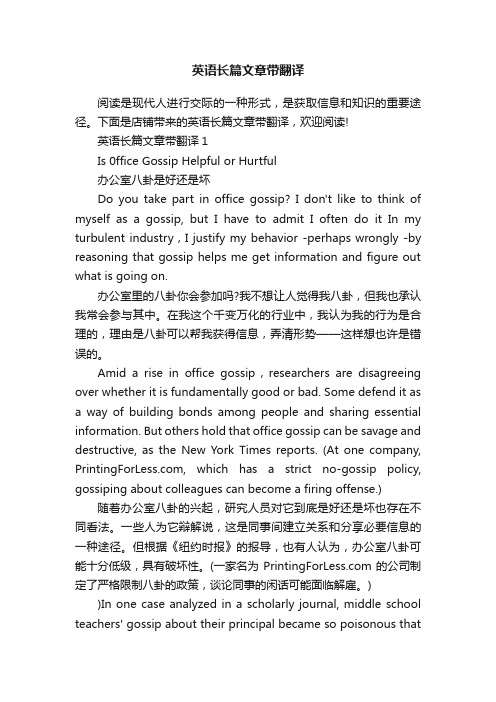
英语长篇文章带翻译阅读是现代人进行交际的一种形式,是获取信息和知识的重要途径。
下面是店铺带来的英语长篇文章带翻译,欢迎阅读!英语长篇文章带翻译1Is 0ffice Gossip Helpful or Hurtful办公室八卦是好还是坏Do you take part in office gossip? I don't like to think of myself as a gossip, but I have to admit I often do it In my turbulent industry,I justify my behavior -perhaps wrongly -by reasoning that gossip helps me get information and figure out what is going on.办公室里的八卦你会参加吗?我不想让人觉得我八卦,但我也承认我常会参与其中。
在我这个千变万化的行业中,我认为我的行为是合理的,理由是八卦可以帮我获得信息,弄清形势——这样想也许是错误的。
Amid a rise in office gossip,researchers are disagreeing over whether it is fundamentally good or bad. Some defend it as a way of building bonds among people and sharing essential information. But others hold that office gossip can be savage and destructive, as the New York Times reports. (At one company, , which has a strict no-gossip policy, gossiping about colleagues can become a firing offense.) 随着办公室八卦的兴起,研究人员对它到底是好还是坏也存在不同看法。
- 1、下载文档前请自行甄别文档内容的完整性,平台不提供额外的编辑、内容补充、找答案等附加服务。
- 2、"仅部分预览"的文档,不可在线预览部分如存在完整性等问题,可反馈申请退款(可完整预览的文档不适用该条件!)。
- 3、如文档侵犯您的权益,请联系客服反馈,我们会尽快为您处理(人工客服工作时间:9:00-18:30)。
太空漫游一星期第二页:你知道吗?1.一个太空空间站移动的速度有多快?2.为什么在太空里物体会漂动?3.你用望远镜能看到什么?4.一个实验有什么步骤?5.宇航员们吃什么种类的食物?6.宇航员们怎样洗澡?7.一套宇航服有多重?8.宇航员们每天锻炼多长时间?9.宇航员们在睡觉前,他们会做什么?第五页:这是2020年八月三日,星期一。
陈华正坐在她的椅子上。
她在鸟的上面,在云的上面,在所有飞机的上面。
她在一艘宇宙飞船里。
陈华是一名宇航员。
她来自中国。
她是一名科学家。
这是她第一次的在太空站的旅行。
她将在这里工作,并且做一些实验。
第六页:在宇宙飞船里还有另外四个人。
汤姆是船长。
他来自美国。
约翰来自澳大利亚。
他是一名医生。
安雅是一位科学家,她来自俄罗斯。
Sae Ree 也是一位科学家。
她来自韩国。
他们都是宇航员。
在开始这次旅行前,所有的宇航员都工作的十分努力。
他们很开心,因为他们现在正在飞往太空站。
这将会是一个令人激动的一周。
第七页:现在是八月四号,星期二。
今天有许多工作要做。
下面是陈华的工作单:上午七点:洗澡上午八点:早餐上午九点:与其他宇航员开会上午十点:在太空站工作上午十一点:与地球上的学生们通话中午十二点:午餐下午一点:休息下午两点:锻炼下午三点:锻炼下午四点:进行西红柿种子实验下午五点:进行西红柿种子实验下午六点:晚餐下午七点:自由活动时间:阅读晚上八点:用望远镜进行观测晚上九点:自由时间:给朋友和家人发电邮晚上十点:睡觉的时间第八页:你今天的时间表是什么?在一天结束的时候再看看你的时间表,把你所做的事情勾出来。
第十页:在太空站今天是八月五日。
宇宙飞船已经到达了太空站。
它在地球上空226千米。
它以每小时28160千米的速度绕着地球飞行。
船长TOM正在把飞船连接到太空站。
这是一个非常困难的工作,他必须得十分小心。
他既不能开的太快也不能开的太慢。
他做到了!现在他们可以进入太空站了。
第十一页:在接下来的几个星期中,太空站将会是这些宇航员们的家。
它既是一个宾馆,也是一所医院,一个实验室。
太空站的每个人见到他们都很开心。
陈华和她的同事们(其他人)带来了信件、礼物、水、食物,以及其他的一些东西。
陈华也很开心,但是她也很想念她的丈夫和儿子。
第十二页:陈华在太空站见了其他的人,他们谈论了他们的工作。
(我的名字是NARESH。
我是一名医生。
在太空里没有引力。
我可以制作新的药品,这些药品是在地球上制作不出来的。
)(我的名字是RACHEL。
我正在制造新的金属。
这些金属将会更轻、更坚固。
)第十三页:(我的名字是TINA。
我给地球上的事物拍照片,并且每天我都看到物体在改变。
一些沙漠和森林变得更大或更小。
当冰雪在山间融化的时候,河流变得更大。
我喜欢看地球,它是那么的漂亮。
我希望人们能够爱护地球!)第十四页:我的名字是MICHAEL。
我正在研究太空。
我用望远镜并且给月亮、行星、恒星拍照。
一架在地球上的望远镜不能看的特别远,但是一架在太空里的望远镜能看到的效果要好得多。
第十五页:陈华告诉其他的宇航员关于她的实验。
她有200000个西红柿种子,她将把这些种子放在太空站外面。
过段时间之后,她再把它们带回地球。
一些初中生将会种植这些(从太空站带回来的)种子。
他们同时也会种植一些普通的种子。
当种子成长的时候,这些学生们将会寻找它们间的不同点。
太空西红柿会是健康的吗?太空西红柿会是大的吗?它们尝起来味道相同吗?你是怎么认为的呢?第十六页:观察---思考---测试----决定(我想看看胡萝卜在零引力的情况下是怎样生长的)你能思考一个太空实验吗/第十八页:早晨七点今天是八月七日。
现在很早,是吃早饭的时间。
陈华已经很饿了。
她使用一把刀、一把叉、一个勺子和一把剪刀。
剪刀打开了食物包装。
陈华跟其他宇航员一起飘在桌边。
她吃炒蛋、香肠、炖番茄和香蕉。
她也喝了桔子汁。
宇航员们在太空里可以吃很多食物,甚至是冰淇淋也可以吃。
第十九页:下午十二点半午饭后,陈华刷牙。
这并不容易。
小的水滴在太空里飞,就像是小的气球一样。
有两根太空软管用于洗澡。
一个软管出水,另一个软管进水。
宇航员们不用毛巾。
宇航员们也需要一个厕所,但是这个厕所是非常特别的。
它没有任何的水,它是用一个真空装置把所有的东西带走。
第二十页:下午两点十分现在是太空行走的时间。
在太空站里,宇航员们穿着普通的衣服。
但是在外面,他们需要特殊的服装。
宇航服在太空中能保护宇航员们。
它们保护他们能抵御寒冷与高温。
它们也携带空气用于呼吸。
宇航服上有双向无线电对讲机,因为宇航员们必须彼此交谈。
宇航服上还有工具,它们很坚固,也是用来保护宇航员的。
第二十一页:宇航员们非常仔细的检查他们的宇航服。
在地球上,宇航服是非常重的,有136千克。
但是在太空,由于没有了引力,所以宇航服并不重,但是却很难穿上。
最终,宇航员们都准备好了。
陈华和MICHAEL 出去了。
第二十二页:陈华使用一个来自加拿大的机器人手臂。
她正在把一个新的卫星放入太空。
这并不简单。
她的衣服和手套又大又厚。
她在地球上已经把这个练习了许多次了。
最后,她完成了她的工作,跟MICHAEL 和SAE REE一起返回了太空站。
陈华很开心。
第二十三页下午四点二十现在,陈华休息的时间到了。
她可以做些什么呢?她可以读书或打牌。
她可以听音乐,也可以眺望窗外。
太空站行走的特别快。
每45分钟就会有一个日出和日落。
陈华正在向窗外看。
她正在寻找地球上一些熟悉的地方。
她想起了家里的丈夫和儿子。
第二十四页下午六点陈华打开了电脑,读起了她的电子邮件。
有许多来自她的朋友和家人的信息。
也有一封来自北京的一名学生的邮件。
嗨,陈华,你好,我很高兴能够写信给你。
我也希望成为一名宇航员。
你是怎样成为宇航员的?你能告诉我一些与之有关的事情吗?送给你最好的祝福ERICA LI北京七中第二十五页ERICA 你好谢谢你的电子邮件我从小学就开始了。
宇航员必须要友好,并且能够在团队中很好的工作。
我进行了许多团队运动。
运动也会让人们健康。
有一些宇航员在大学里学习科学与数学。
其他的人,比如我,就学习生物和医药。
宇航员必须会说不同的语言。
我会说英语、汉语和俄语。
这能帮助我和其他的宇航员们交谈。
努力学习,进行体育运动,有很多兴趣爱好,多交朋友。
我确信总有一天你会成为一名宇航员的。
加油宇航员陈华第二十六页晚上7:30现在是陈华锻炼的时间。
在太空里锻炼是非常重要的。
在地球上,是有引力的,你必须多用你的肌肉。
你站立、坐下、行走。
但是在太空里是没有引力的,你是漂浮的,这让你的肌肉变得很弱。
第二十七页晚上9:15多么繁忙的一天!该睡觉了。
陈华把她自己系在她的床上。
她不想飘走。
她想好好睡一觉。
当你累的时候是很容易入睡的。
她梦到了她的丈夫和儿子。
第二十八页看这些地球的照片,你能认出这些地点吗?第二十九页你会问宇航员什么问题呢?给陈华写一封电子邮件吧。
第三十页宇航员们通常做些什么?把下列宇航员在太空里做的事情划勾。
吃、玩电脑游戏、锻炼、睡觉、画画烧饭、工作、看及发电子邮件把卫星放入太空、洗澡(盆浴,用浴缸)做实验、用摄像机刷牙、洗澡(淋浴)第三十二页今天是八月八日。
今天对于陈华来说是非常重要的一天。
今天她将会开始她的实验。
她已经吃完早饭,准备开始工作了。
其他的宇航员正在一起,他们正在彼此交谈,他们谈的很小声。
陈华有点担心,太空站是不是出什么麻烦了?怎么了?为什么其他宇航员挪动设备、使用起工具来了呢?这也许不是好的一天。
第三十三页船长TOM朝陈华走来:“陈华,你能跟我来一下吗?”“出什么事了吗?”陈华很担心。
“不,不,一切都很好,只要跟我来就好了。
”船长TOM说。
陈华跟着船长TOM。
宇航员们都在一个电视屏幕旁。
船长TOM把她带到电视屏幕前。
“看,”他说。
第三十四页陈华看到了她的丈夫和儿子在电视里。
“生日快乐!”他们说。
“噢,天哪,今天是我的生日,我都忘记了。
”大家都笑了起来。
第三十五页陈华很开心能看见她的丈夫和儿子。
她可以跟他们在太空交谈。
简直太吃惊了!第三十六页你能记住关于陈华的什么事情?判断正误。
正确的用T,错误的用F。
陈华来自韩国她有丈夫和一个儿子她是一名科学家她用胡萝卜做实验她在太空行走她儿子的生日是八月八日她在小学参加了许多团队运动她说汉语、英语和法语她学的是数学和医药观鸟一日记第二页你知道吗?你对鸟类有什么了解?1、鸟儿住在哪里?2、一只鸟有多少羽毛?3、为什么不同的鸟有不同的脚?4、哪种鸟下的蛋最大?哪种鸟下的蛋最小?5、为什么不同的鸟产下不同颜色的蛋?6、哪种鸟会缝纫?读这本书,找到问题的答案。
了解鸟儿的不同的形状和大小。
这很有意思哦!第四页PETER醒来了,往窗外看。
这是春天里温暖的一天。
今天他看到了一些新的东西。
在他窗户的外面有一棵树。
在树上有一个鸟巢,里面有六个可爱的小鸟蛋。
PETER想要摸摸它们,但是他对鸟儿知道的不多。
他想要去了解更多一点。
---妈妈,你能告诉我一些关于鸟类的事情吗?---我也不知道太多的关于鸟的事。
但是我知道你不应该碰鸟蛋。
让我们喊你的表姐来。
ALICE知道很多鸟儿的事。
第五页---你能告诉我一些关于鸟儿的什么事情吗?---这是只喜鹊。
喜鹊是非常漂亮的鸟。
它的名字用汉语说就是“喜鹊”---你知道鸟是什么吗?---鸟是一种动物,它会飞。
---你确定吗?让我们在这本书里找到答案吧第六页猫头鹰,会飞。
企鹅,不会飞无翼鸟(又称几维鸟,或鹬驼),不会飞鸵鸟,不会飞。
天鹅,会飞。
鸡,不会飞第七页哦,现在我知道了。
并不是所有的鸟儿都会飞。
同样,有一些动物,比如蝙蝠,却会飞,但是他们却不是鸟类。
所有的鸟儿都有羽毛、翅膀和两只脚。
对的。
让我们出去走走,看看别的一些鸟。
也许我们能了解到一些更新的关于鸟儿的事。
我把这本书也带着。
为什么蝙蝠不是鸟呢?因为蝙蝠有毛(无羽有毛),它们的婴儿天生就如此(born live)。
蝙蝠有胳膊、手和脚。
鸟类有羽毛,它们的婴儿是从蛋孵化而来的。
鸟有翅膀,但是没有胳膊或手。
第八页找出鸟类用方框中的词把句子补充完整1、?在晚上飞并且吃小动物2、?是一种新西兰的鸟。
它有很小的翅膀,它不会飞3、?是大的黑白相间的南极的海鸟。
它不会飞4、我们饲养?是为了它的蛋和肉5、?是大的非洲的鸟。
它跑的很快,但是不会飞6、?是大的白色的鸟,有着长长的脖子。
它生活在湖上或河上第十页PETER和ALICE在公园里。
他们正在寻找鸟儿。
他们在交谈。
“首先,我们必须得记住一些规则。
我们必须呆在公园里的小路上,不能打扰鸟巢。
我们不能摸鸟蛋或幼鸟。
”ALICE 说。
第十一页“我们能看看鸟巢吗?”PETER问。
“好的,可以。
但是我们不能呆太久。
我们可以拍照,但是不能把羽毛或鸟窝带走。
”ALICE说。
“为什么?”“因为一些鸟会把羽毛用在鸟窝里。
并且有一些鸟会年复一年的使用同一个鸟窝。
